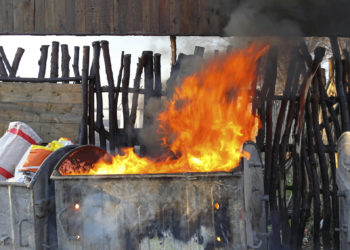I think people in this country have had enough of experts. — Michael Gove, Member of the British Parliament, Brexit Advocate, June 2016
Personally, never thought of academics as 'experts'. No experience of the real world.
— Glyn Davies (@GlynDavies) October 29, 2016
You know, I’ve always wanted to say this—I’ve never said this before with all the talking we all do—all of these experts, ‘Oh we need an expert—’ The experts are terrible. — Donald Trump, Republican Candidate, now President, April 2016
Two of the most surprising and destabilizing political outcomes in major Western democracies occurred last year in conjunction with the winning sides aggressively bashing experts and expertise. Now, in the US, we have a Secretary of Education with no prior experience in public education, not even through her children’s school attendance; a Secretary of Energy who was surprised to learn that the US Department of Energy doesn’t just deal with oil and gas leases but oversees the country’s nuclear arsenal; a Secretary of Housing and Urban Development with no experience in government or in housing policy; a President with no prior experience in government or governing; and an administration that is stifling information and demoting expertise on what seems to be an almost daily basis.
The Death of Expertise: The Campaign Against Established Knowledge and Why It Matters, by Tom Nichols, seeks to uncover the fundamental forces driving expertise out of the public sphere, forces that also promote the belief that every opinion is equally valid and that every perspective is deserving of equal reverence. As Nichols writes:
. . . when democracy is understood as an unending demand for unearned respect for unfounded opinions, anything and everything becomes possible, including the end of democracy and republican government itself.
The book is written in a frustrated and exasperated tone that makes the text feel emotional and scattershot, especially early on. The passion of the writing may appeal to you. Nichols is clearly unhappy with the state of affairs. While I feel the same way, the book could have been better without the bombastic tone, which may alienate all but those already convinced of the problem.
As an object, the book suffers from a few flaws. For a book from a prestigious publisher (Oxford University Press), I found a few typos and inconsistencies relatively easily (including different capitalization of the subtitle on different versions of the cover, not one of which matches what I deem correct). Worse, I found continuity problems, which suggested that the book may have been hastily reorganized at one point. This may explain the lumpy feeling of the read. For example, there is a reference to a Jimmy Kimmel sketch early in the book, a sketch the author doesn’t describe until 183 pages later. This struck me as unfortunate for a book defending expertise. Maybe President Trump’s election accelerated the publication timeline, inadvertently producing more evidence of how the velocity of inexpert misinformation can upset expertise?
A few editing gaffes aside, the book has some new, very current, and useful examples underscoring key points. And the book gets better as it goes.
The early sections draw from ideas I’ve encountered before — the mental mistakes we make (availability errors, framing effects, confirmation bias); how experts are created, validated, and sustained; and how mistakes by or disagreements among experts are exaggerated to undercut the very idea of expertise (the phenomenon becoming know as “whataboutism”). The drum-banging doesn’t help in these sections, slowing the book down as the author once again tells you how troubling it is that experts are under siege. Exasperation feels, at times, like his form of filler — maybe when the editor asked for 100 more words to help pad the page count, he threw in a few more lines of indignation and concern.
The industrialization of “the university” has caused higher education to replace actual education with cynical strategies meant to drive more students into paying tuition and getting degrees
But after a rough start, the book hits its stride when Nichols gets to the section, “Higher Education.” Or maybe I was experiencing a form of confirmation bias, as here was a discussion I’d been looking for, but have not been able to find — namely, the discussion about how higher education’s transformation into a service industry has fed the death of expertise. From student entitlement to cynical administrators, the higher education system has, Nichols asserts, become about validating and credentialing paying students and, indirectly, their parents — that is, the customers. Redefining the relationship of experts into service workers has had a corrosive effect on expertise, Nichols asserts, while the industrialization of “the university” has caused higher education to lose much of its power, replacing actual education with marketing and grading strategies designed to have more students pay tuition and get degrees. As Nichols writes:
Students at most schools today are treated as clients, rather than as students. Younger people, barely out of high school, are pandered to both materially and intellectually, reinforcing some of the worst tendencies in students who have not yet learned the self-discipline that once was essential to the pursuit of higher education. Colleges are now marketed like multiyear vacation packages, rather than as a contract with an institution and its faculty for a course of educational study.
The role of email is called out in an interesting way, with Nichols detailing stories about how the medium has fostered a false sense of intimacy and informality between students and faculty, while also making some students view faculty as their “intellectual valets.”
Colleges bootstrapping themselves up to universities also strikes Nichols as one way in which higher education is devaluing itself and the very idea of expertise, with distinctions between rigorous, diverse, and fulsome universities smudged or lost. Worse, Nichols feels, colleges masquerading as universities can overreach again by adding doctoral programs, “creating degrees that do not actually signal a corresponding level of knowledge.” While this “can push what might have been a serviceable local college into a new status as a half-baked university,” the real problem comes down the road:
Americans are burying themselves in a blizzard of degrees, certificates, and other affirmations of varying value. People eager to misinform their fellow citizens will often say that they have graduate education and that they are therefore to be taken seriously. The only thing more disheartening than finding out these folks are lying about possessing multiple degrees is to find out that they’re telling the truth.
Some of the stories Nichols recounts about student behavior toward faculty and administrators — and the subsequent cowardice exhibited by large universities — are truly chilling. Yale is called out as being especially egregious, and the recent controversy over the Calhoun Building, along with the administration’s capitulation, would seem to fit the model. Students are learning that emotions and demonstrations matter more than ideas or logic, and that emotional outbursts can be used to cow faculty and sabotage rationality, complexity, and nuance.
What’s lost is the chance to teach that life tends to blend good qualities with objectionable qualities — in people, in systems, in governments, in compromises. The emerging need for “safe zones” and “trigger warnings” can’t abide this complexity. University life has become all-or-nothing, intellectually and otherwise — right or wrong, pleasing or objectionable, satisfying or intolerable. Polarization becomes the starting position in this world.
Because expertise cannot be asserted in the face of undisciplined emotions and binary thinking, the trend to treat students as customers and catering to these indulgences becomes stronger, further stifling expertise. Anyone can be emotional, so anyone can beat an expert by merely acting out. Nichols’ book details many academic careers and even university budgets undercut by this looming threat to civil discourse and expert education.
A recent post by Danah Boyd, who works at Microsoft Research studying data and society, asserts that training students in media literacy may itself be part of the problem, feeding a worldview filled with false equivalencies and moral relativism. Boyd talks about “the cultural context of information consumption that we’ve created over the last thirty years” and feels “[t]he problem on our hands is a lot bigger than most folks appreciate.” The drive to inculcate media literacy in young people, Boyd argues, may have backfired by emphasizing distrust, individualization, and relativistic qualities, rather than logic, evidence, and expertise:
. . . when it comes to information, [children] are taught that they are the sole proprietors of knowledge. All they have to do is “do the research” for themselves and they will know better than anyone what is real. . . . In the United States, we’re moving towards tribalism, and we’re undoing the social fabric of our country through polarization, distrust, and self-segregation. And whether we like it or not, our culture of doubt and critique, experience over expertise, and personal responsibility is pushing us further down this path.
This brings to mind the flaws of the “balanced debate,” which I discussed in a post earlier this year. The balanced debate approach foments ignorance, not knowledge, because a balanced debate is a form of false equivalence that creates more opportunities for ideas to fit into any existing biases readers may bring.
In dealing with “expertise,” Nichols also needs to touch on that third-rail e-word, “elitism.” Elites are natural — there are only so many people with the talent and ability to play in the NBA, to run in the Olympics, or to swim the English Channel. Sports make elites both obvious and acceptable. Few people would watch Usain Bolt and call his speed “elitist.” It is merely elite, and because it’s visible and obvious, his elite status is acceptable, even admired.
People who use the Internet to look up fossil fuels come away with more confidence in their expertise about petroleum and dinosaurs
Not so with intellectual elites and their expertise, especially in an age of sound bites, Wikipedia, and social media. In fact, the new information world gives non-experts false confidence. Evidence shows that browsing more information quickly and superficially actually increases confidence in opinions about that information as well as slightly related information. People who use the Internet to look up fossil fuels come away with more confidence in their expertise about petroleum and dinosaurs. If such simple things can give you outsized confidence and make you feel like an expert in minutes, why give credence to actual experts? Aren’t their claims of expertise now seen as purely elitist, an attitude and a pose, not an actual fact? Look how much I know about dinosaurs after searching about fossil fuels, after just a few minutes online?
If I can hit a few keys and feel as fast as Usain Bolt, then how special is his elite ability and expert training, really?
Like anyone, Nichols finds it difficult to write about elites without stumbling into the noxious notion that anyone who says they know more about a subject is a snob, effete, or arrogant. After all, this is where the emotional attacks on elites usually start. But the goalposts have shifted against experts and expertise. As he writes:
. . . maybe we have become so inclined to celebrate the authenticity of all personal evidence that it is now elitist to believe in reason, expertise, and the lessons of history.
I agree with Nichols’ perspective on this entirely — the arrogance is actually coming from the uninformed and illogical, who have been elevated by lower barriers to entry, whether in media or higher education. There is a lack of humility and care as emotional gratification becomes the main driver of civic interactions. There is a comfort level — material wealth, social deference, media empowerment — that makes people seek more elusive emotional comforts. In these contexts, the emotional benefits of winning and feeling superior are the end points, outcompeting more admirable but less emotionally gratifying outcomes like understanding, sympathizing, or learning. And certainly, being wrong is beyond comprehension.
Nichols book is framed by academic navel gazing to some extent. He leaves out many other factors that are driving polarization in society, such as income inequality, gated communities, racial and geographic isolation, political corruption, media consolidation and politicization, and anti-immigrant attitudes. This is a book about intellectual elites written for intellectual elites.
Nichols’ book includes good sections on the news media and the fallibility of experts themselves, with this passage underscoring how emotional gratification does provide an odd space in which experts can still thrive:
. . . while some laypeople do not respect an expert’s actual area of knowledge, others assume that expertise and achievement are so generic that experts and intellectuals can weigh in with some authority on almost anything.
This only happens when the “expert” opinion comports with something that provides emotional gratification, of course.
Nichols ends the book by contemplating how this all might resolve. It is a hard knot to start to unravel, but he sees one possible way out — the rebellion of experts, as captured in this 2015 public service announcement from Jimmy Kimmel:
Here, physicians swear openly and show their emotions and frustration. Perhaps this is the way forward — to appropriate the emotionalism that is blinding part of our culture to facts and logic, and show that experts can be just as emotional and passionate, while being smarter, more informed, and more dedicated. It shows they are human. It shows that they care. And it shows that they can get fed up with being pushed aside by amateurs and frauds. A recent study tested this hypothesis, and showed that scientists taking stands laced with emotions and clear opinions didn’t hurt their credibility. Maybe this is how expertise becomes reinvigorated and finds its way to a new spot where emotions have a definite role and aren’t eschewed as inappropriate.
It’s a strange cure for a strange malady, but it just might work.
[A related post expands on how entertainment has fused with news and information to undermine facts and general awareness.]
[Hat tip to Nick Kind for the Danah Boyd pointer.]
Discussion
7 Thoughts on "Book Review: “The Death of Expertise” by Tom Nichols"
Thank you, Mr. Anderson, for your timely an informative review here.
This is a fascinating subject. I live in University town in the South Appalachians. Having acquired a baccalaureate many years ago (LSU,1973), I have striven to retain a lifetime learning perspective while working in construction, raising three children with my RN nurse, and writing four novels of historical fiction.
The hometown University here provides a wealth of information and scholarship. The library itself is an information/research resource that must never be eliminated, nor compromised. The role of scholars in maintaining the lamp of knowledge is valuable and essential in a nation of free-thinking citizens.
All ye scholars, keep up the good work.
But let me encourage and exhort you in these three respects:
~ While working studiously to maintain your standards of expert scholarship, strive also to cultivate sensitivity to the non-expert community that surrounds you and provides essential services.
~ Represent well your academic worldview to the world in general by writing–along with your publications of footnoted expertise– books through which the people who live and work outside of academia may see clearly the value of supporting scholarly research and the universities wherein that important work continues day after day, year after year.
~ Wikipedia is an essential research tool for authors such as me who frequently must retrieve fingertip facts such a dates, locations, and spellings. The Scholarly community must engage perpetually with Wikipedia and other online information sites so that the weekend scholars of this cyber-world do not fall prey to the deceptions or fake news and, worse yet, false information.
Mr. Anderson et al, keep up the good work in the Kitchen. Thanks for all you do toward maintaining an expert perspective for us citizens of the world. No matter what they say out there in in the haphazard world, the truth is: we need you.
The free people and nations of the world are depending on you, if we are to remain free. Do not retreat from the battle.
My pet peeve about expertise is when scientists with very little if any expertise in a subfield will sign a petition that settles a particular area of science by a vote of acclamation. That’s not science.
Brings to mind Richard Hofstadter’s great book published way back in 1963: Anti-Intellectualism In American Life. Here’s a brief passage from it…
“Anti-intellectualism . . . is founded in the democratic institutions and the egalitarian sentiments of this country. The intellectual class, whether or not it enjoys many of the privileges of an elite, is of necessity an elite in its manner of thinking and functioning . . . . Intellectuals in the twentieth century have thus found themselves engaged in incompatible efforts: They have tried to be good and believing citizens of a democratic society and at the same time to resist the vulgarization of culture which that society constantly produces.”
Nichols paints with a broad brush. The characterizations he makes, as reported here, are certainly not valid for all universities in this country. And what he appears to have said about the Yale incident betrays a shallow understanding of what actually went on. Did he actually talk with any Yale students and faculty, or just take his cues from Fox News? And saying that students use email a lot makes one wonder; it’s way down the list of media that students use these days, as I know from waiting a long time to get replies from undergraduates I keep in touch with. As for OUP, it seems its quality control is slipping. I too have found egregious errors in books I have read in recent years.




